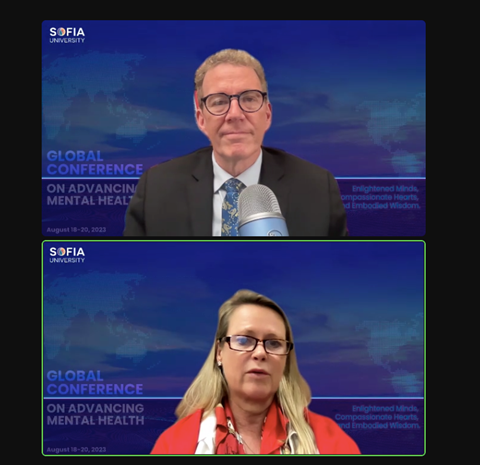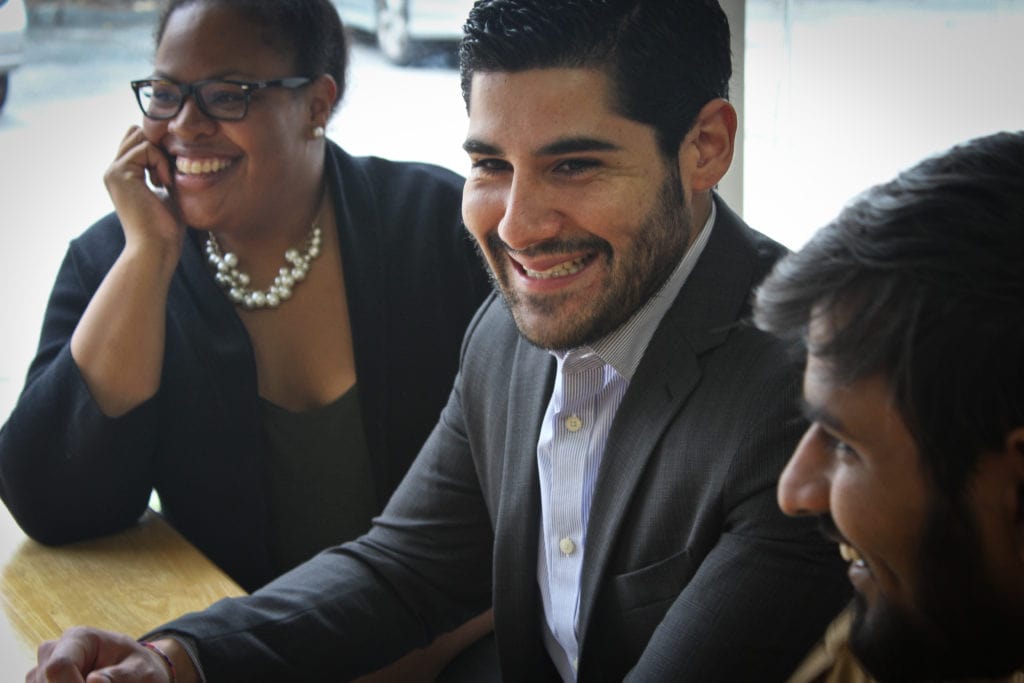As the curtains rose for Day 2 of the esteemed Global Conference, participants and speakers were beckoned into a profound exploration of two pivotal themes: “Transpersonal Psychotherapy and Healing” and “Post-Pandemic Narratives and Resiliency Building.” These subjects, both timely and timeless, propelled discussions that interwove historical practices with contemporary methods. The day presented a rich tapestry of insights, juxtaposing ancient wisdom with modern therapeutic modalities. Through keynote addresses, illuminating panel discussions, and impactful presentations, attendees embarked on a journey that shed light on the vast terrains of human consciousness and the myriad avenues for healing and growth.
Theme II: Transpersonal Psychotherapy and Healing
Keynote Address: Biotransenergetics: An Integral Transpersonal Approach To Healing And Self-realization
President of EUROTAS, Dr. Pier Luigi Lattuda introduced Biotransenergetics (BTE) is an Integral Transpersonal Psychotherapy (ITP) approach that deals with the participatory dialogue of the human experience in the world. BTE offers a new look at an ancient vision through innovative tools and methods, representing an evolution of the psychological models that preceded it. Psychology and Psychotherapy of Liberation, 2.0 we might say. Capstones of BTE are terms like Passage from the zero, Persistence of Contact, and Mastering of Transe. Biotrans- energetics is a term Dr. Lattuda coined for his innovative therapy model.
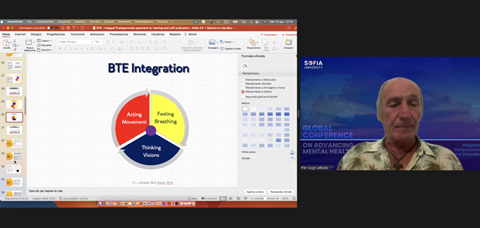
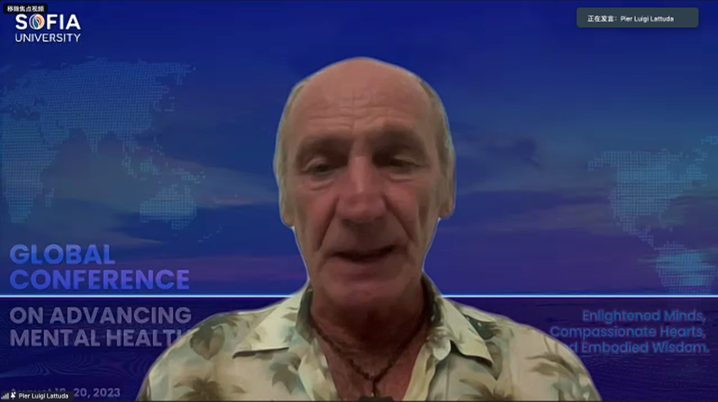

Panel Discussion: Transpersonal Psychotherapy and Healing
Dr. Vitor Rodrigues led the discussion with a focus on how taking into account horizontal expansion in several qualitatively different layers of human experience (hence the elevator metaphor) may contribute to mind-body healing. Panel participant, Dr. Shiuya Sara Liuh shared on traditional Chinese Buddhist and Taoist approaches to dreamwork, underscoring convergence points with modern approaches such as Junguian and the specificity of dream work and incubation and interpretation in Taiwanese Taoism for solving believers personal problems.
Dr. Giovanna Calabrese helped us understand how the conscious acceptance of illness in body or spirit as being part of life while taking responsibility for our own healing path can be transformative and healthy. Marion Boon discussed regression therapy, its power for fast and deep healing and the necessity for us to take it into account after strong clinical evidence claims for this. Specific techniques such as Deep Tissue Memory Release and Phenomenon of Soul Fragmentation or the healing power of Being in the present was part of her presentation. Multiple views complemented each other towards finding answers on how to heal the human mind-body complexes.
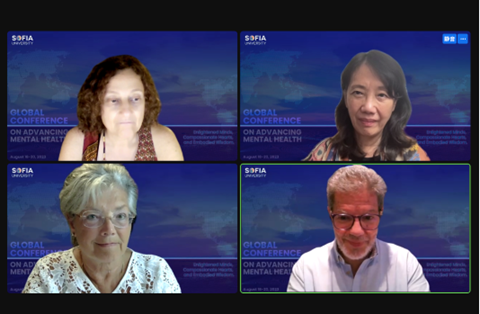

Submitted Presentation
In the realm of psychology and mental exploration, a diverse array of studies and perspectives have emerged. Paul Kiritsis explored the intriguing connection between creativity and psychopathology, delving into the complexities that arise at this intersection. James W. Thompson Jr. took a mixed-methods approach, investigating the impact of binaural beat-infused meditation soundtracks on emotions, purpose, and mood. In a bid to provide evidence-based interventions, Sikun Li and Guang Zeng focused on the effectiveness of the Sacred Geometry® Healing System in aiding children with autism, offering potential avenues for healing and growth. Mariya Katrina Punay shifted attention towards the psychotherapeutic application of Transpersonal Therapy, leveraging its principles to address the deep-seated wounds of Post Traumatic Stress Disorder and depression. Lastly, Stephanie Witechowsky and Bridget McGowan explored the delicate balance of emotional vulnerability and its potential to induce transpersonal experiences, unveiling new dimensions in the understanding of human consciousness. These diverse studies collectively contributed to the ever-evolving landscape of psychology, offering insights into the intricate facets of the human mind and its limitless potential for healing and expansion.
Theme III: Post-Pandemic Narratives and Resiliency Building
Keynote Address: Research on Observation, Religion and Belief System
The Albert Ray Lang Professor of Anthropology at Stanford University Dr. Tanya Marie Luhrmann discussed seemingly strange experiences, such as a voice whispered on the wind, or a god who speaks from on high, but voices are far more common than we think. In this talk, she argued that voices—the sense of being called by another–are at the heart of the human experience of the mind. Our minds are deeply social—less interior inner universes, more like dinner parties with noisy guests. Religion and for that matter play offers a way of using that social dimension to your advantage— crafting an inner coach who is not the self and who, by being other, manages the inner cacophony. Sometimes of course this process goes terribly wrong. She hoped participants would open a discussion about how people use social practice to shape inner worlds and moral purpose, and about the complex relationship of spiritual experience and psychosis. It seems likely that fostering positive relationships with our inner imaginings enhances well-being.




Panel Discussion: Is the Pandemic Just a Meaningless Mayhem or a Chance for Reflection and Growth?
The discussion, led by Panel Chair Dr. Caifang Zhu, was enriched by the insights of esteemed participants including Dr. Jun Tong, Dr. Marilyn Schlitz, and Dr. Robert Wood. Central to their discourse was the theme of post-pandemic healing, woven intricately through the tapestry of narrative reconstruction and the fortification of resilience. Contemplating the aftermath, Dr. Robert Woods posed a pivotal question: Should our narrative of the pandemic solely recount the havoc it wreaked, reduced to a tale of “meaningless mayhem”? Alternatively, could it be recast as a mythic demise, paving the way for rebirth? A transformation of narrative from desolation to opportunity for rejuvenated growth and understanding. Advocating a holistic approach, Dr. Marilyn Schlitz emphasized the essential role of resilience in the post-pandemic era. Her perspective encompassed not only a retrospective gaze into our shared history, acknowledging our collective losses, but also the illumination of a collective vision for the future. Dr. Jun Tong delved into clinical cases from pandemic-stricken China, unraveling the complex web of intergenerational and repeated trauma. Struggling to give these experiences due mourning, she and her team navigated the intricate defense mechanisms that patients often employ, including denial, forgetfulness, and somatization. Their research suggested that the shadows of family trauma frequently fall upon the shoulders of children and adolescents. Through a poignant personal account, Dr. Caifang Zhu bared the raw impact of the pandemic on himself and his family, encompassing physical, social, and psycho-spiritual dimensions. His tale mirrored a journey of healing and resilience, intertwined seamlessly with the fabric of his community and workplace in Beijing. In this confluence of perspectives, the symposium illuminated the nuanced facets of post-pandemic recovery — a narrative quilt threaded by mythic reimagining, collective resilience, intergenerational trauma, and personal rejuvenation.
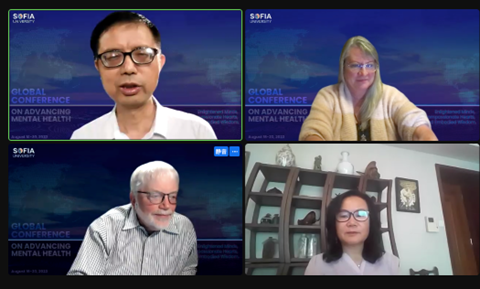

Submitted Presentation
In the realm of psychology and therapy, understanding the multifaceted nature of human experiences has become more vital than ever. This compilation of topics delved into unique approaches and strategies that professionals in the field are utilizing to address a variety of challenges. The contributions of Teresa Reigosa, Shirindokht Nourmanesh, Lei Wang, and Yan Gong each shed light on distinct facets of psychological well-being, personal growth, and therapeutic efficacy.
Teresa Reigosa’s work emphasized the importance of equipping educators with the tools to navigate turbulent times. As educational landscapes evolve and crisis situations become more common, it’s imperative that teachers possess social-emotional competence. Reigosa’s insights offered practical methods for educators to enhance their emotional intelligence, fostering a resilient and empathetic teaching environment.
Shirindokht Nourmanesh introduced us to the world of culturally competent trauma-informed therapy, specifically tailored for immigrant women. The narratives of immigrants often carry layers of trauma and adjustment challenges. Nourmanesh’s innovative model not only acknowledges these complexities but also offers a framework to empower women through culturally sensitive healing, thereby fostering resilience and growth.
Lei Wang delved into the realm of transpersonal therapy, inviting us to explore the spiritual dimensions of psychological well-being. Wang’s work underscored the integration of spirituality into the therapeutic process, recognizing its potential to unlock profound healing and transformation. This approach challenges traditional paradigms by embracing the interconnectedness of mind, body, and spirit.
Yan Gong’s contribution brought the concept of transpersonal psychotherapy to the forefront. Drawing from various spiritual and holistic traditions, Gong shed light on the transformative power of transcending individual limitations. This approach not only seeks to alleviate psychological distress but also to facilitate profound healing by connecting individuals to broader aspects of existence.
Closure Remarks
Dr. Dorote Lucci summarized a range of topics covered today and expressed gratitude for participation, highlighted the importance of respect and individual journeys, and emphasized the value of open dialogue and acceptance of diverse experiences. She also reminded participants that the shared perspectives were personal and didn’t necessarily represent any organization.
The closing statement emphasized the power of love, both in intellectual discussions and intuitive insights. Dr. Lucci encouraged participants to carry this love forward, inspiring interactions and deepening understanding. The day wrapped up with warm wishes and expressions of gratitude for the engaging and respectful discussion.
